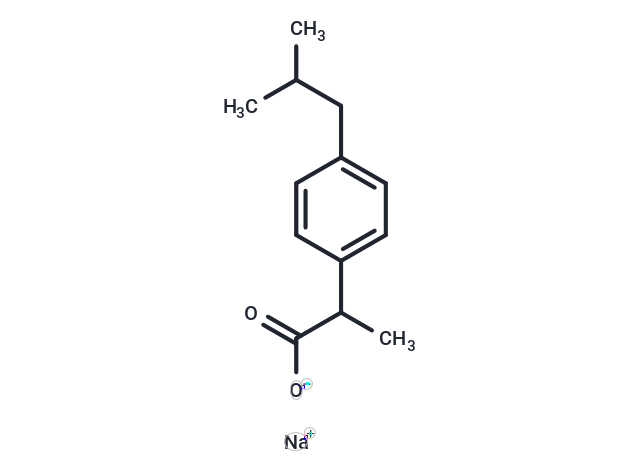Shopping Cart
- Remove All
 Your shopping cart is currently empty
Your shopping cart is currently empty

Ibuprofen ((±)-Ibuprofen) sodium is an orally active, selective inhibitor of COX-1 (IC50 = 13 μM) that inhibits cell proliferation and angiogenesis, and induces cell apoptosis. It is a nonsteroidal anti-inflammatory agent and a nitric oxide (NO) donor, used in research on pain, swelling, inflammation, infection, immunology, and cancers [1] [2] [5] [8].

| Pack Size | Price | Availability | Quantity |
|---|---|---|---|
| 25 mg | Inquiry | 1-2 weeks |
| Description | Ibuprofen ((±)-Ibuprofen) sodium is an orally active, selective inhibitor of COX-1 (IC50 = 13 μM) that inhibits cell proliferation and angiogenesis, and induces cell apoptosis. It is a nonsteroidal anti-inflammatory agent and a nitric oxide (NO) donor, used in research on pain, swelling, inflammation, infection, immunology, and cancers [1] [2] [5] [8]. |
| In vitro | Ibuprofen sodium, over 24 hours, exerts an inhibitory effect on COX-1 and COX-2 with IC50 values of 13 µM and 370 µM, respectively [1]. At a concentration of 500 µM for 48 hours, it restricts AGS cell (Adenocarcinoma gastric cell line) proliferation and angiogenesis while promoting apoptosis [2]. Furthermore, this dosage regimen modulates the gene expression within AGS cells by downregulating Akt, VEGF-A, PCNA, Bcl2, OCT3/4, and CD44, and concurrently upregulating wild type P53 and Bax genes [2]. Additionally, a 24-hour exposure to the same concentration aids in microtubule reformation and cholesterol transport in cystic fibrosis (CF) cell models and primary CF nasal epithelial cells, promoting microtubule extension towards the cell periphery [3]. It also amplifies UV-induced cell death in MCF-7 and MDA-MB-231 cells through a photosensitization process [4]. Cell viability assays reveal that ibuprofen sodium decreases AGS cell viability in a concentration and time-dependent manner, characterized by IC50 values ranging between 408 µM and 630 µM, depending on the assay and duration [2]. |
| In vivo | Ibuprofen sodium, when administered in different dosages and methods across various animal models, has demonstrated significant therapeutic effects. In a syngeneic Balb/c mouse model of postpartum breast cancer, feeding animals with ibuprofen sodium (300 mg/kg for 14 days) suppressed overall tumor growth and improved anti-tumor immunity, without triggering adverse autoimmune responses [5]. Subcutaneous injections of ibuprofen sodium (60 mg/kg every second day for 15 days) in a rat model reduced the risk of chronic oxaliplatin-induced peripheral neuropathy by lowering sensory nerve conduction velocity [6]. Oral administration of ibuprofen sodium at a dose of 20 mg/kg every 12 hours for a total of five doses showed a decrease in muscle growth, specifically in the average muscle fiber cross-sectional area, without affecting the regulation of supraspinatus tendon adaptations to exercise [7]. Additionally, oral administration of ibuprofen sodium at 35 mg/kg twice daily attenuated the inflammatory response to Pseudomonas aeruginosa in a chronic pulmonary infection rat model [8]. These findings highlight ibuprofen sodium's potential as a versatile anti-inflammatory and anti-tumor agent across various disease models without significant side effects. |
| Molecular Weight | 228.267 |
| Formula | C13H17NaO2 |
| Cas No. | 31121-93-4 |
| Storage | Powder: -20°C for 3 years | In solvent: -80°C for 1 year | Shipping with blue ice. |

Copyright © 2015-2025 TargetMol Chemicals Inc. All Rights Reserved.